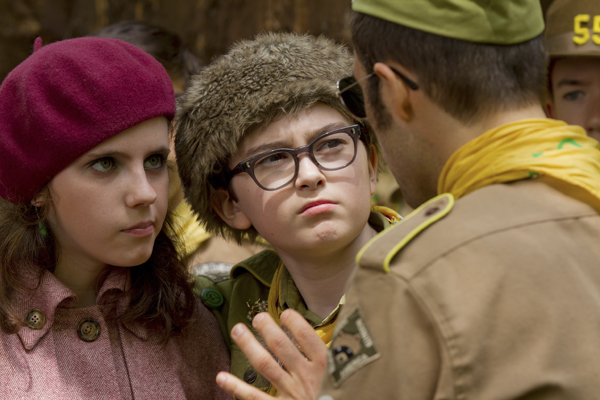
Next year marks the centennial of Benjamin Britten’s birth, and though none of his works will be performed at the Metropolitan Opera next season, the composer nevertheless receives an unexpected tribute in Wes Anderson’s Moonshine Kingdom. In its opening sequence, pre-teen Suzy Bishop and her three younger brothers gather around a portable record player during a rainy afternoon to listen to Britten’s A Young Person’s Guide to the Orchestra: Variation and Fugue on a Theme of Purcell. The composition’s subtitle might also describe Anderson’s latest film, which, for the next 90 minutes, will lightheartedly riff on the hallmarks of his previous films.
There’s the familiar erudite family (headed by Bill Murray and Frances McDormand) living in social and geographical isolation on New Penzance Island in Maine (alas, there are no pirates). As pretty as a picture book, the film’s color-coordinated production design turns to the past, here the mid-1960s, when adolescent girls still wore knee socks with saddle shoes and boys hadn’t yet grown out their hair. (As usual, there’s a great selection of songs on the soundtrack, most likely culled from the bottom 40 of the pop charts. The British Invasion hasn’t yet made an inroad to this New England hamlet.) Born in Texas in 1969, Anderson has imagined the ’60s on the East Coast as if from an Eddie Bauer catalog and Boys’ Life, with the sensibility of The New Yorker.
And then there are the outsiders. Sam Shakusky (the spookily self-possessed newcomer Jared Gilman) runs away from Camp Ivanhoe, operated by the Boy Scouts? er, “Khaki Scouts,” as Anderson and co-writer Roman Coppola call them, to convene at a designated time in a designated field with fellow runaway Suzy. She’s brought along her kitten, a portable record player (so she can listen to her favorite, Françoise Hardy), and lots of adventure books to read by the campfire. The youngsters had first met the previous summer when they locked eyes backstage of a church production of the rarely performed opera Noye’s Fludde, again by Britten, and immediately recognized a kindred spirit, which is promptly followed by a first kiss. They have corresponded since, hatching a plan to suffice on their own on the island. Sam’s concerned and gosh golly scout master (Edward Norton), his troop, and the island’s sheriff (Bruce Willis, so steady and Solomon-like that he may have a career as an updated Gary Cooper) follow in hot pursuit.
The most obvious of Anderson’s trademarks is his deliberately droll and deadpan dialogue—Kara Hayward (who plays the headstrong Suzy) has the lethal stare down pat. As a director, he’s never been one for naturalism, and his juvenile leads master the urbane non sequiturs with the requisite flat delivery. True, the characters may only be 12 years old, but they are as resigned and depressed as any of The Royal Tenenbaums. Indeed, all of the characters are as self-consciously eccentric as in any of his previous films.
Anderson’s scenario borrows heavily from the sort of tales devoured by Sam and Suzy, yet their courtship has a contemporary upfront frankness, up to a point. Even when they run around in their underwear, the two are never physically adventuresome beyond their age, and aside from a small hint at attempted suicide, the script stays away from the dark and edgy. Nevertheless, Suzy lets off some pubescent, overly-mature-for-her-age sensuality. Shooting was completed over a year ago, so it’s doubtful that Anderson intended for her to look like a pouting baby Lana Del Rey, but maybe it’s the blue eye shadow.
Far from jadedness, there’s a sweetness and gullibility to the duo that would be at home in his last film, a PG-rated take on Roald Dahl’s Fantastic Mr. Fox. Though Moonrise is live action as opposed to the stop-motion animated Fox, there’s still a sense that anything could happen and that anything is possible. A constantly tracking camera, CGI effects, and all—Anderson is still a kid at heart, who embraces all the artifice that movies have to offer.






I love Wes Anderson but he never should have made this film. Mis-cast, especially the lead children who couldn’t act for their lives. Councidentally Wes Anderson is OBVIOUSLY not an actors director. As this review states, Anderson lacks a pension for ‘naturalism’ or as I like to say ‘reality.’
It felt entirely forced from beginning to end. Every previous project of Anderson’s is so unique and complete and this clearly lacked the soul and inspiration of his earlier films. Watching the scenes between the two kids felt like being dragged through gravel. Following the tremendously inspired, revelatory “Fantastic Mr. Fox” “Moonrise Kingdom” is a drastic step back and a sign that, perhaps, Wes Anderson has peaked and now run out of stories to tell that live in him the way his earlier work has. Take all of the A class talent of veteran actors and this film is blatant drudgery comingled with incessantly resurfacing allusions and approaches already utilized in his earlier films.
Also, he made the young ‘actress’ into a lolita from the get go. I hate the way movies take young teen actesses and